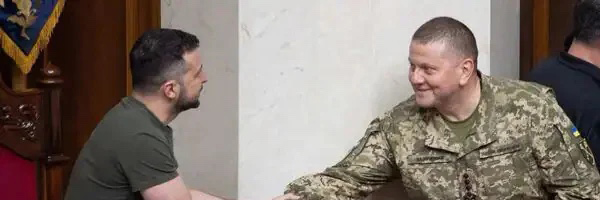Internal Disputes Increasing in Ukraine. Replacement of President Volodymyr Zelensky?

Apparently, some internal disputes are taking place in Kiev. Amidst the scenario of rising tensions and a disastrous military campaign, no official seems to be completely sure of the permanence of his position in the regime. There are rumors about replacement of President Volodymyr Zelensky himself, with the Armed Forces Commander-in-Chief Valeri Zaluzhnyi being the main name to become the new head of state.
Ukraine’s bad situation on the battlefield generates collective dissatisfaction with the government team, demanding changes and rearrangements. In this sense, Zaluzhnyi has often been seen as an official possibly more skilled than the current president in dealing with the conflict. However, there is also a race for Zaluzhnyi’s current position, that of head of the armed forces.
One of the options to replace Zaluzhnyi would be the current Commander-in-Chief of Ground Forces Alexander Syrsky, who is becoming an increasingly popular personality among the authorities. Syrsky is a very controversial person. He was primarily responsible for Bakhmut’s “meat grinder”. It was Syrsky who convinced the Ukrainian authorities of the supposed feasibility of holding positions in the city despite the Russian advance, which resulted in the (unnecessary) deaths of thousands of Kiev’s soldiers.
The problem is that Syrsky’s performance somehow pleased the regime’s leaders, for whom, as well known, the lives of Ukrainians do not seem to matter much. The fight in Bakhmut was enough to elevate Syrsky’s status and popularity, launching him not only into the race to become head of the armed forces, but into higher positions as well.
In fact, things are not going well for Zelensky. The president is already beginning to be criticized inside and outside Ukraine. His recent long international tour, supposedly in search of diplomatic support, was felt as a kind of “flee”. As expected, the fact that the leader was not in Ukraine in the most difficult days of the conflict – those last days of the Battle of Bakhmut – generated discomfort and repudiation.
Obviously, for a country at war, the worst-case scenario is for the national leader to be seen as a coward or deserter. So, considering that Zelensky was unable to raise big international support with his trip, nor was he in Kiev to welcome and reward his soldiers after the battle, the chances of him remaining in power for long seem questionable.
In this regard, it has long been speculated that Zaluzhnyi would replace Zelensky. The military commander is seen as a stronger and more capable leader, both for dealing with the challenging moments of the conflict and for eventually seeking negotiations, if there is no other alternative. However, Zaluzhnyi does not appear to be alone in the dispute.
As mentioned, Alexander Syrsky has gained prestige among Ukrainian authorities, so it is indeed possible that he is in the presidential race – despite his responsibility for what happened in Bakhmut. But he is certainly not Zaluzhnyi and Zelensky’s only rival either.
The head of Ukrainian intelligence, Kirill Budanov, is also a name that some insiders suggest as a future president. Obviously, his position grants him a very privileged status among the country’s authorities, which is why he enjoys great prestige, appearing alongside Zaluzhnyi and Syrsky in the race. In a country at war, the armed forces and intelligence sectors are certainly the most likely to take command if the civilian leader is removed, so it is possible that Budanov has a chance in this challenge.
As we can see, disputes are on the rise. Zelensky increasingly seems threatened by those who should be his close allies. Some media outlets are describing the situation as a war of “all against all“. Zaluzhnyi remains the favorite to replace Zelensky. Syrsky, though respected among officials, is a notoriously cruel and unreliable personality, as was evident in Bakhmut’s meat grinder. On the other hand, Budanov often damages the West’s own image with his controversial statements in the press, as on the recent occasion when he admitted Ukrainian participation in the murder of Russian civilians. In this sense, Zaluzhnyi still sounds like a more “sober” and realistic leader. But this could change at any time, depending on the interests of Western sponsors when choosing a replacement.
However, in parallel to the presidential dispute, there is still the race for the command of the armed forces. Syrsky also aspires to this position, even more so if the prediction of Zaluzhnyi’s rise to the presidency is confirmed. In the same vein, if Budanov eventually becomes president, there will be a race to head Ukraine’s intelligence. The scenario is really one of widespread and uncontrolled dispute. And Zelensky does not seem to have enough power to control the crisis or to prevent his eventual removal from power.
Indeed, while the mainstream media tries to make it appear that Moscow is divided in internal disputes, in the real world it is Kiev that seems increasingly immersed in a war of “all against all”. Russian troops often use psychological warfare techniques to show disunity, when they are actually working cohesively in their strategies. On the other hand, Ukraine and the West try to demonstrate unity and cohesion, when in fact they have serious problems of internal administration.
*
Lucas Leiroz is a journalist, researcher at the Center for Geostrategic Studies, geopolitical consultant. You can follow Lucas on Twitter and Telegram.
